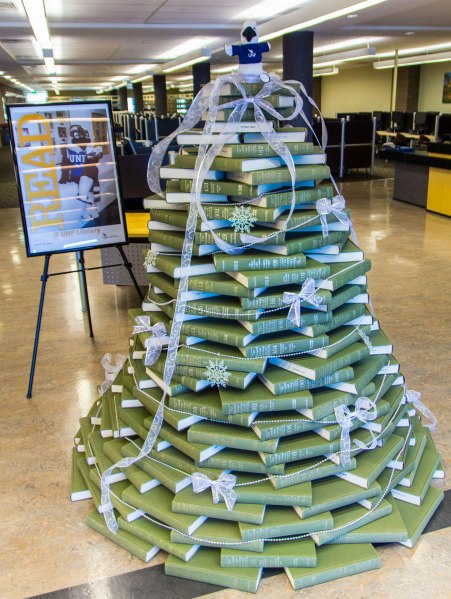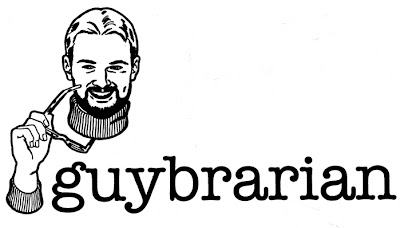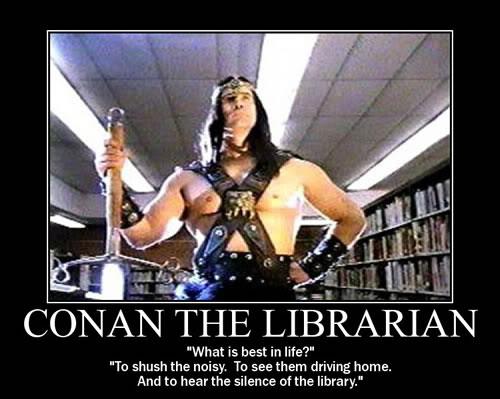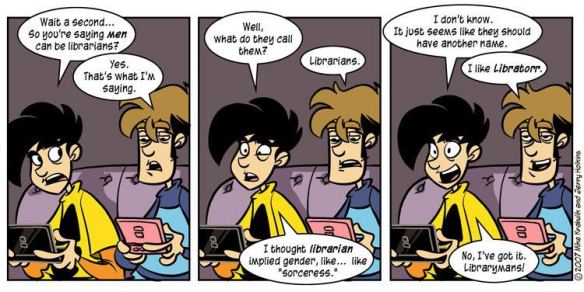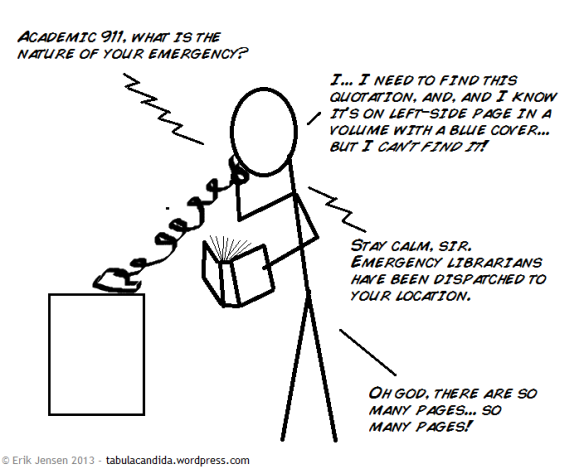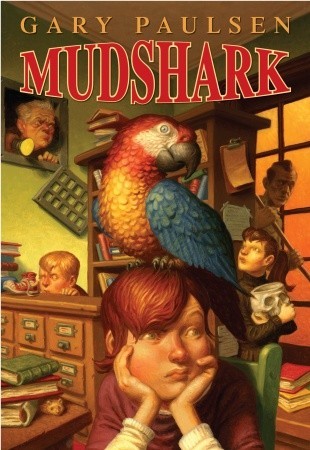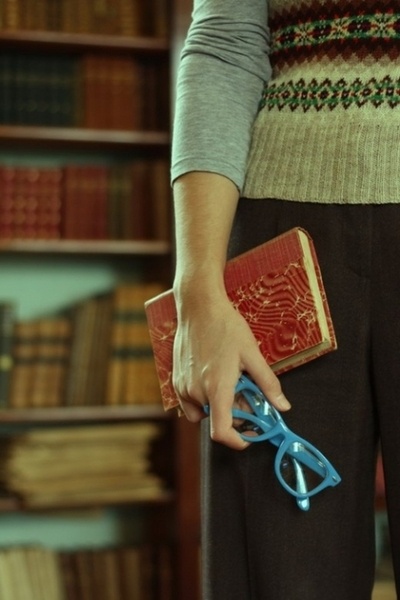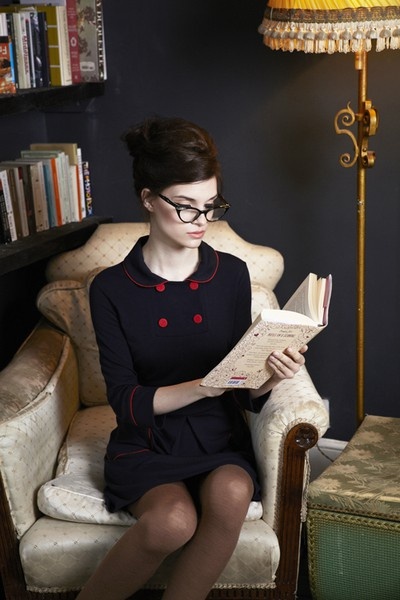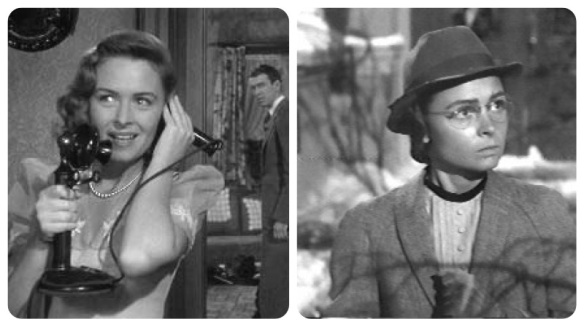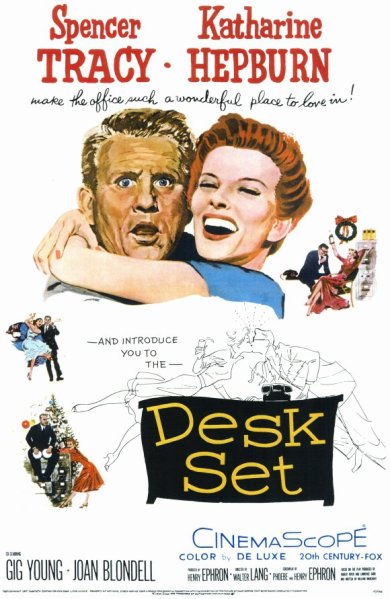
Bunny Watson: I don’t smoke, I only drink champagne when I’m lucky enough to get it, my hair is naturally natural, I live alone… and so do you.
Richard Sumner: How do you know that?
Bunny Watson: Because you’re wearing one brown sock and one black sock.
Desk Set is to librarians as Citizen Kane is to cinefiles. Is that too general a statement? Let me explain. Every summer break my library has a lunch + movie afternoon for staff members. We choose a movie, eat pizza, and then pleasurably blow a couple hours in a dark conference room. The last couple years we’ve voted on the movie we get to watch – much to my chagrin, because some people have… questionable taste. The first year we held our lunch + movie (+ inevitable nap) day the film choice wasn’t in our hands, it was decided by the higher-ups. Nobody cared, however, because the film chosen was Desk Set.
It’s the most perfect of films about librarians because it stars the most perfect librarian in film history: Bunny Watson, as played by Katherine Hepburn. Although she was once box office poison, Hepburn is one of the greatest actors in the history of – okay, enough with the hyperbole, so let’s just say she’s a treasure. Desk Set was released in 1957, after The African Queen, The Philadelphia Story, and (my favorite) Bringing Up Baby – but before Guess Who’s Coming to Dinner, On Golden Pond, and (my other favorite) The Lion in Winter. By comparison to these classics, Desk Set is little more than fluff. When one considers the impact it continues to have on the librarian figure in film, however, its true impact can be seen.
The film takes place at the fictional Federal Broadcasting Network in Manhattan. A sort of NBC, its reference library “which is responsible for researching and answering questions on all manner of topics” (Wikipedia). The head of this department is none other than Bunny Watson, a middle-aged, astute woman who knows all the names of Santa’s reindeer but who can’t seem to recognize that her seven-year relationship with a career-driven network executive is going absolutely nowhere. Making matters worse, the network is secretly merging with another company, and to help the transition they’ve hired a consultant named Richard Sumner (Spencer Tracy) to install two EMERAC computers in the reference library. Bunny and her fellow librarians fear they’re being replaced, and they rebel. However, as it becomes clear that the computers aren’t nearly as skilled as the librarians – they glitch and end up sending a pink slip to everyone in the company, even the president – it’s revealed that Sumner never intended the computers to replace the librarians, only to help them. All is forgiven, and like it so often happens with happy endings, Bunny and Richard decide to make a go for it. N’aww.
One of the main themes of Desk Set is learning to grow and change with the times. Part of why I think this film is so appealing is the fact that it’s pertinent even now, almost sixty years later. The threat of technology (computers! the internet!) is still on the minds of many librarians, even some of those I work with. The automation of information is terrifying to those who fear their job security becomes less assured as time goes on and budget cuts become more the rule than the exception. These are the same struggles libraries have been dealing with for years, and yet technology is here to stay: Bunny Watson and her coworkers recognized that, even in 1957.
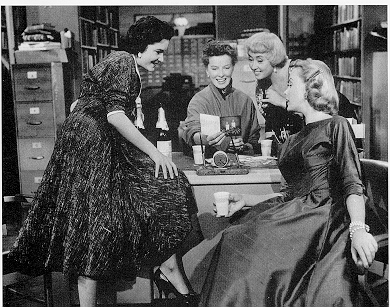
Bunny, the strong, incredibly bright reference librarian, is an interesting figure when it comes to librarians in pop culture. Hepburn was 49 or 50 when the film was made and released, and Bunny is certainly the sort of unconventional characters that she was well known for playing. Bunny was unmarried, but in a long-term, intimate relationship. She’s extremely focused on her career, so much so that she has a winding, spindly plant growing all over her office – she’s literally put down roots in her library. And who wouldn’t? She has a great mind for facts, a closet of awesome dresses, and a group of positive and supportive women who work (and drink) with her. It’s arguably the most awesome job in the history of awesome jobs, and it’s been inspiring envy from librarians for years. Case in point: “I want Bunny Watson’s Job in ‘Desk Set'”. Who doesn’t?
However, because this is the 1950s, and it is a Hepburn-Tracey film, Bunny does want romance in her life. While she loves her job, she hopes hopes hopes that her longtime boyfriend will propose to her after seven years. When she breaks it off with him, she’s already kindling a relationship with Richard Sumner. At the end, when the wrongs are righted and it’s agreed the computers aren’t taking over, Richard asks Bunny to marry him, and she says yes. It’s interesting to note that the film was titled “His Other Woman” when it was released in the UK, referring to the EMERAC computer which Richard calls “Emmy” for short. Therefore for most of the film, the love triangle isn’t between Bunny, Richard and Bunny’s executive boyfriend, but Bunny-Richard-Emmy. The executive guy never stood a chance, but the real threat to Bunny and Richard’s happiness is the very thing that Bunny thinks is threatening her job security.
So where do we place Bunny among the short list of librarian stereotypes? She’s an old maid, but she doesn’t act like one. She loves her job (go librarians!), but she also wants romance. In the end, she gets both. Hepburn isn’t Hot Librarian material, but she also isn’t dowdy – she’s fashionable and likable as well as wicked smart. When Sumner asks her pointed questions in order to determine how the mind of a truly capable reference librarian works, I can’t help but marvel at her skills and good humor:
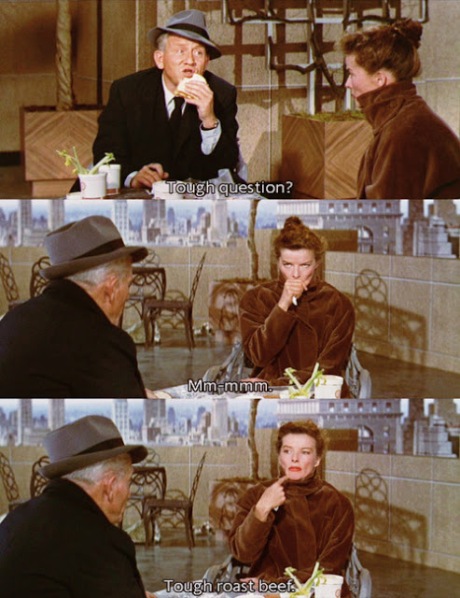
I would say that Bunny does not fit into a classic stereotype, which is what makes her so appealing. She is a positive, go-getter librarian figure amongst a sea of Mean Old Lady and Mousy and Sexy Librarians. She’s tough. She’s skilled. She’s confident. She’s kind. She’s willing to accept change in her career.
I don’t want Bunny Watson’s job, I want to be her.
